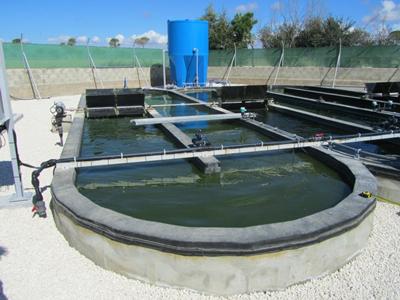Research project: All-Gas: Industrial scale demonstration of sustainable algae cultures for biofuel production
Funded by the EU's FP7 programme
Funded by the EU's FP7 programme

The full chain of processes from algal ponds to biomass separation, processing for oil and other chemicals extraction, and downstream biofuel production, as well as the use in vehicles, will be implemented on a 10 ha site. Pilot and demonstration scale facilities are based at Chiclana de la Frontera in the south of Spain.
Wastewater influent and nutrients will be re-used to stimulate algae growth. The specified algae yield of 100 tonnes/ha-year will be obtained by integrating and upscaling innovative systems. The extracted oils will be processed at an existing biodiesel plant (capacity 6000 t/yr of used oils), designed by a consortium partner. With a net oil content of 20 %, enough biodiesel to run ~200 cars is expected. The residual algae will be digested together with the wastewater solids in order to produce biogas and CO2. The biogas will be purified and compressed to serve as vehicle fuel for a number of cars equivalent or greater than the ones fuelled by liquids.
To reach the enhanced algal yield, additional CO2 will be obtained by the thermal transformation of external biomass (i.e. sludge from a wastewater treatment plant located in the area), together with internal biomass (digestate from residual algae and wastewater solids), to generate flue-gas as heating source for drying the biomass previous to combustion. The options to transform the excess thermal energy generated into electricity to power the systems will be analysed for financial and technical viability. As some key process elements have not yet been proven on industrial scale, the technical risks will be limited by an initial prototype phase. During these initial 2 -3 years, the whole chain will be built and operated with each unit in its maximum size - for instance, two ponds systems of 1000 to 2000 m2 linked to the respective harvesting, processing and digestion. The prototype as well as the future full-scale facility will be investigated for environmental and social impacts in order to maximize sustainability. These results and specific diffusion efforts will allow extrapolation to other sites.
Aqualia (Project Coordinator)
Feyecon BV
BDI - BIOENERGY INTERNATIONAL AG
HyGear BV
MTD Ltd
FRAUNHOFER-GESELLSCHAFT ZUR FOERDERUNG DER ANGEWANDTEN FORSCHUNG EV
Roberts, K., Banks, C.J., Heaven, S. Characteristics of several species of marine and freshwater microalgae and their suitability as feedstock for anaerobic digestion. 13th World congress on anaerobic digestion: recovering bioresources for the world. 25-28 June 2013, Santiago de Compostela, Spain.
Banks C. J., Heaven S., Lara Corona E.S., Rogalla F., (2011) Energy production from integration of high rate anaerobic and algal wastewater treatment: the EU FP7 All-Gas project 9th IWA Specialist Group Conference on Waste Stabilisation Ponds, Adelaide, 1-3 Aug Paper 45
Mendoza, J.L., Granados, M.R., de Godos, I., Acién, F.G., Molina, E., Heaven, S. and Banks, C.J. (2013) Oxygen transfer and evolution in microalgal culture in open raceways. Bioresource Technology, 137, 188-195.
Mendoza, J.L., Granados, M.R., de Godos, I., Acién, F.G., Molina, E., Banks, C. and Heaven, S. (2013) Fluid-dynamic characterization of real-scale raceway reactors for microalgae production. Biomass and Bioenergy, 54, 267-275.
Theme Water and Environment


